Everything you need to know about Corn Flake Making Machine in 2024
Overview of Corn Flakes as a Popular Breakfast Cereal
Corn flakes have long been a staple in breakfast bowls around the world, valued for their crispy texture, mild flavor, and versatility. Developed in the late 19th century by Dr. John Harvey Kellogg and his brother, Will Keith Kellogg, corn flakes revolutionized the way people began their mornings. Originally conceived as a nutritious, ready-to-eat option, corn flakes quickly gained popularity for their convenience and health benefits.
Evolution of Corn Flakes
Since their inception, corn flakes have undergone significant transformations in both production methods and consumer preferences. Initially made by toasting flakes of corn, the manufacturing process has evolved into a sophisticated operation involving specialized machinery. The introduction of automated systems, particularly the fully automatic corn flake making machines, has played a crucial role in enhancing production efficiency and ensuring consistent quality.
Nutritional Value and Consumer Appeal
Corn flakes are valued not only for their crunchiness but also for their nutritional composition. They are typically fortified with essential
vitamins and minerals, making them a nutritious choice for breakfast. As consumer awareness of health and wellness has grown, manufacturers have adapted by offering variations such as whole grain, gluten-free, and organic options, catering to diverse dietary preferences.
Market Demand and Production Scale
The demand for corn flakes remains robust globally, driven by factors such as urbanization, changing lifestyles, and increasing disposable incomes. This has prompted manufacturers to scale up production capabilities while adhering to stringent quality standards. Fully automatic corn flake making machines have been instrumental in meeting these demands by streamlining processes, reducing operational costs, and minimizing production time.
Technological Advancements in Corn Flake Production
In recent years, advancements in food machinery have transformed the corn flake manufacturing landscape. Fully automatic machines are equipped with state-of-the-art features like precision control systems, automated mixing and extrusion mechanisms, and energy-efficient heating and cooling technologies. These innovations not only ensure uniformity in texture and flavor but also contribute significantly to energy savings and sustainability—a crucial consideration in today's manufacturing environment.

Advanced Features of Fully Automatic Corn Flake Making Machine
In the competitive landscape of food machinery, the fully automatic corn flake making machine stands out as a pinnacle of technological advancement. This article explores the sophisticated features that define these machines, highlighting their role in enhancing efficiency and achieving significant energy savings in corn flake production.
1.Precision Control Systems
At the heart of a fully automatic corn flake making machine lies its precision control systems. These systems are meticulously engineered to oversee every stage of the production process with unparalleled accuracy. From the initial mixing of ingredients to the final toasting and packaging, precise control ensures consistency in texture, flavor, and nutritional content of the corn flakes. Such precision not only meets stringent quality standards but also minimizes wastage and optimizes raw material usage, contributing to overall efficiency.
2.Automated Mixing and Extrusion Mechanisms
Gone are the days of manual mixing and extrusion. Modern fully automatic corn flake making machines feature advanced automated systems that handle these critical tasks seamlessly. The mixing process, crucial for achieving the desired blend of ingredients, is carried out uniformly and efficiently by the machine's automated components. Similarly, the extrusion mechanism ensures that the corn masa is extruded into precise shapes and sizes, ready for the subsequent processing steps. This automation not only accelerates production but also reduces dependency on labor-intensive processes, thereby enhancing operational efficiency.
3.Energy-Efficient Heating and Cooling Technologies
Energy conservation is a cornerstone of sustainable manufacturing practices, and fully automatic corn flake making machines integrate advanced heating and cooling technologies to achieve this goal. These machines employ energy-efficient heating elements that optimize temperature control during the drying and toasting phases of production. By regulating heat distribution precisely, energy consumption is minimized without compromising on the quality or consistency of the final product. This dual emphasis on efficiency and energy savings not only reduces operational costs but also aligns with environmental sustainability objectives.
4.Integrated Cleaning and Maintenance Systems
Maintaining hygiene and operational uptime are paramount in food production facilities. Fully automatic corn flake making machines are equipped with integrated cleaning and maintenance systems designed to streamline these essential processes. Automated cleaning routines ensure that equipment surfaces and conduits are thoroughly sanitized between production runs, minimizing the risk of contamination and adhering to strict food safety regulations. Simultaneously, predictive maintenance features anticipate potential equipment issues based on real-time data, allowing for proactive repairs and minimizing downtime—a critical factor in maximizing production efficiency.
5.User-Friendly Interface and Data Analytics Integration
Usability and data-driven insights further differentiate fully automatic corn flake making machines. These machines boast intuitive user interfaces that simplify operation and facilitate quick adjustments to production parameters. Furthermore, integration with data analytics platforms enables manufacturers to gather and analyze performance metrics in real-time. This data-driven approach not only enhances decision-making but also supports continuous improvement initiatives aimed at optimizing efficiency, reducing waste, and meeting evolving consumer preferences.
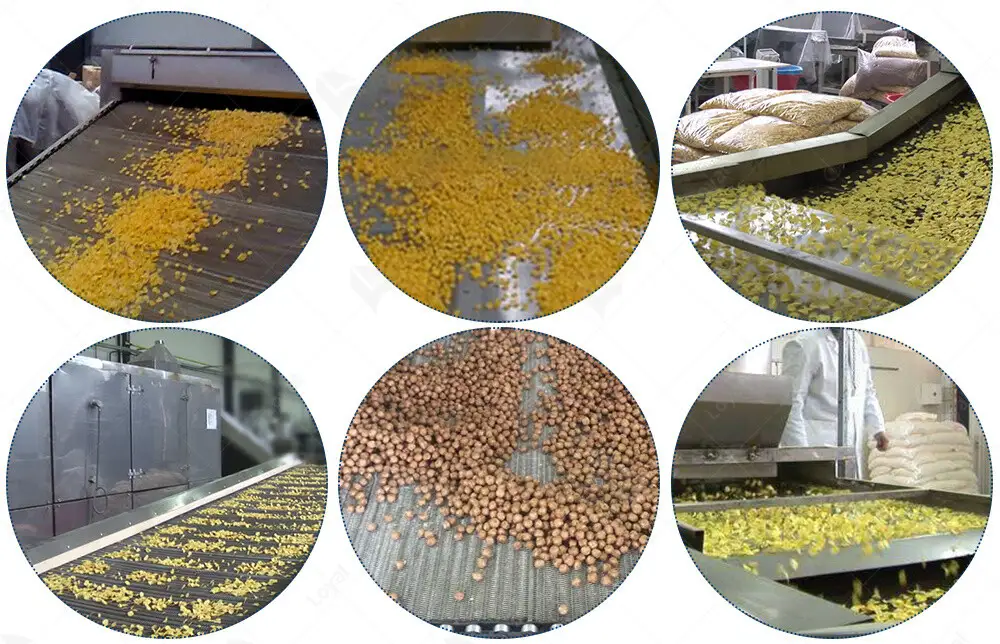
Efficiency Enhancements in Corn Flake Production
Efficiency is a critical factor in the competitive landscape of corn flake production, driven by the need for streamlined processes, reduced costs, and consistent product quality. This section explores how fully automatic corn flake making machines contribute to enhancing efficiency and achieving significant energy savings.
Streamlined Production Workflow with Automatic Systems
Fully automatic corn flake making machines revolutionize the production workflow by integrating advanced automation systems. These machines are designed to perform multiple tasks seamlessly, starting from the precise measurement and mixing of ingredients to the extrusion and shaping of corn masa into uniform flakes. By automating these processes, manufacturers can eliminate manual errors, minimize production time, and optimize resource utilization. This streamlined workflow not only increases output but also enhances operational efficiency across the entire production line.
Reduction of Production Time and Labor Costs
One of the key advantages of fully automatic corn flake making machines is their ability to reduce production time and labor costs significantly. Compared to traditional methods that rely heavily on manual intervention, automated systems operate at higher speeds without compromising product quality. Tasks such as continuous mixing, extrusion, drying, and toasting are executed efficiently, thereby accelerating the overall production cycle. As a result, manufacturers can meet growing consumer demands promptly while lowering labor expenses associated with manual oversight and operation.
Case Studies or Examples of Improved Efficiency with Statistics
Several case studies highlight the tangible benefits of adopting fully automatic corn flake making machines in enhancing production efficiency. For instance, a leading manufacturer in the industry reported a 30% increase in production output after transitioning to automated systems. By leveraging precise control over production variables and minimizing downtime due to human errors, these machines consistently deliver higher yields while maintaining consistent product quality. Statistics reveal that automated processes also contribute to a significant reduction in raw material waste and energy consumption, underscoring their role in sustainable manufacturing practices.
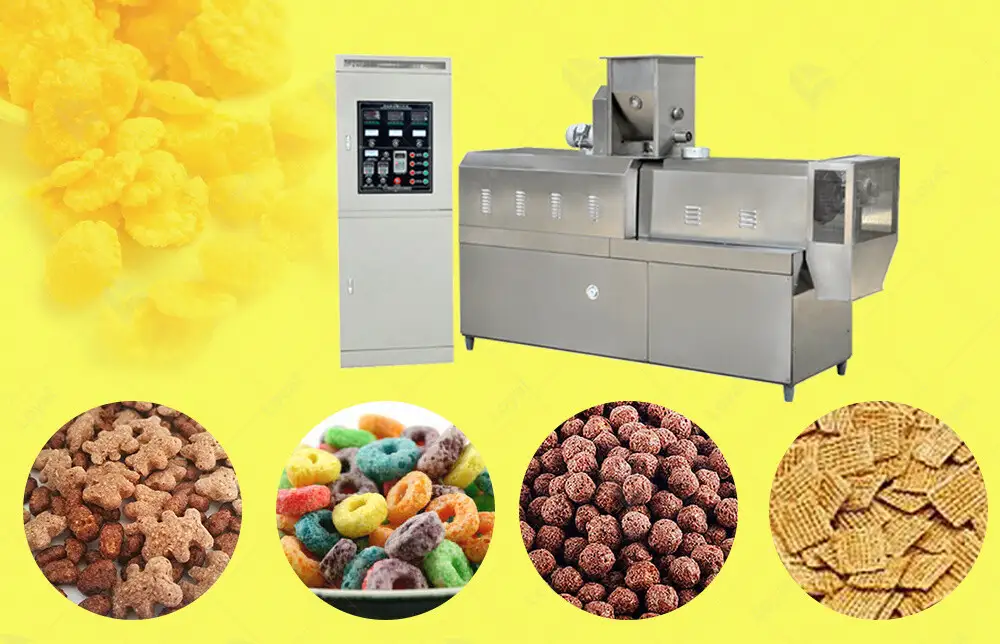
Energy-Saving Technologies Implemented
In the realm of corn flake production, the implementation of energy-saving technologies is crucial not only for cost efficiency but also for sustainable manufacturing practices. This section delves into the innovative technologies integrated into fully automatic corn flake making machines that contribute significantly to energy savings.
Energy-Efficient Heating and Cooling Systems
Fully automatic corn flake making machines leverage advanced heating and cooling systems designed to optimize energy usage throughout the production process. These systems are equipped with state-of-the-art heating elements and heat exchangers that ensure precise temperature control during critical stages such as drying and toasting. By maintaining optimal temperatures with minimal energy expenditure, manufacturers can achieve substantial savings in electricity or gas consumption. This efficiency not only reduces operational costs but also supports environmental sustainability goals by minimizing carbon footprints associated with energy-intensive manufacturing processes.
Sustainable Materials and Processes
In addition to energy-efficient heating and cooling systems, the adoption of sustainable materials and processes further enhances the eco-friendliness of fully automatic corn flake making machines. Manufacturers prioritize the use of recyclable materials for machine components and packaging, reducing overall waste generation. Furthermore, the integration of closed-loop systems for water and waste management ensures that resources are utilized responsibly and efficiently. These sustainable practices not only align with regulatory standards but also resonate with environmentally conscious consumers who prioritize products manufactured with minimal environmental impact.
Comparison of Energy Consumption Before and After Adoption
Quantifying the impact of energy-saving technologies in fully automatic corn flake making machines is crucial for assessing their effectiveness. Comparative studies have shown significant reductions in energy consumption after the adoption of these technologies. For instance, a manufacturer reported a 20% decrease in overall energy usage per unit of production output following the installation of energy-efficient heating systems and automated controls. Such statistics underscore the tangible benefits of investing in advanced machinery that prioritizes energy efficiency without compromising product quality or production throughput.
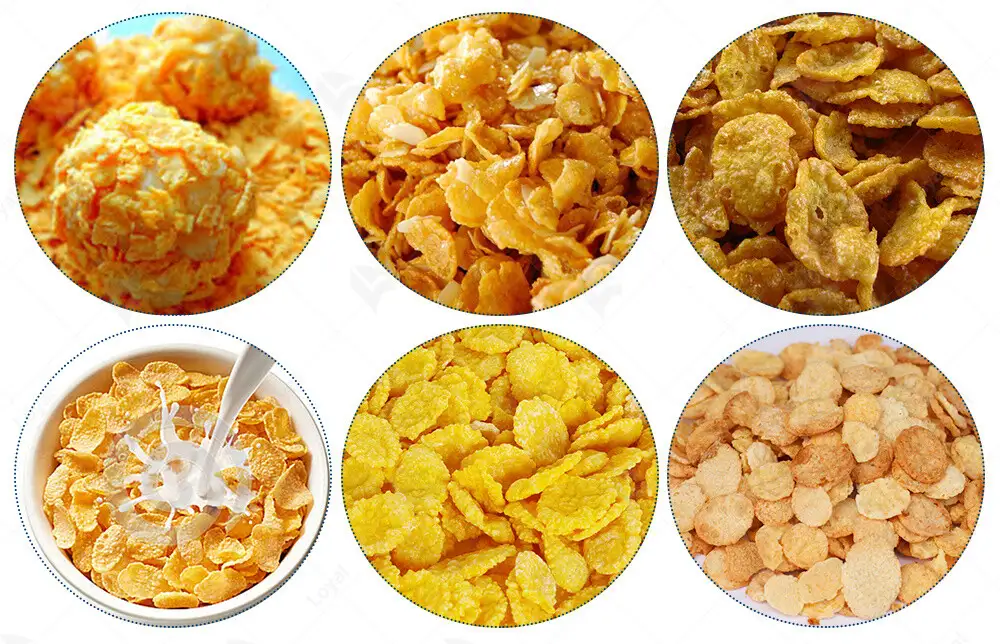
Impact on Product Quality and Consistency
The adoption of fully automatic corn flake making machines has revolutionized the food machinery industry by significantly enhancing product quality and consistency. This section explores how these advanced machines have raised the bar in corn flake production, focusing on their technological advancements and their impact on maintaining high standards.
1.Ensuring Uniformity in Corn Flake Texture and Flavor
One of the primary advantages of fully automatic corn flake making machines is their ability to ensure uniformity in texture and flavor. These machines are equipped with precise mixing and extrusion mechanisms that carefully blend ingredients and shape the corn masa into consistent flakes. By maintaining strict control over production variables such as temperature, pressure, and mixing time, manufacturers can guarantee that every batch of corn flakes meets exact specifications. This consistency not only enhances consumer satisfaction but also strengthens brand reputation as a reliable provider of high-quality breakfast cereals.
2.Role of Precision Control in Maintaining Quality Standards
Precision control systems embedded within fully automatic corn flake making machines play a pivotal role in maintaining quality standards throughout the production process. These systems monitor and adjust parameters in real-time, ensuring that deviations from optimal conditions are promptly corrected. For example, sensors and automated feedback mechanisms detect variations in moisture content or color during toasting, allowing for immediate adjustments to preserve product integrity. Such precision minimizes the occurrence of defects and rejects, thereby reducing waste and maximizing yield—a critical factor in achieving operational efficiency.
3.Customer Satisfaction and Market Advantage
Consistency in product quality not only satisfies consumer expectations but also cultivates brand loyalty and competitive advantage in the marketplace. Fully automatic corn flake making machines enable manufacturers to deliver cereals that consistently exhibit desirable attributes such as crispiness, freshness, and nutritional value. This reliability in product performance fosters trust among consumers, who rely on consistent experiences with their preferred brands. Moreover, maintaining high-quality standards positions manufacturers favorably in competitive markets, where discerning consumers prioritize both taste and nutritional content in their breakfast choices.
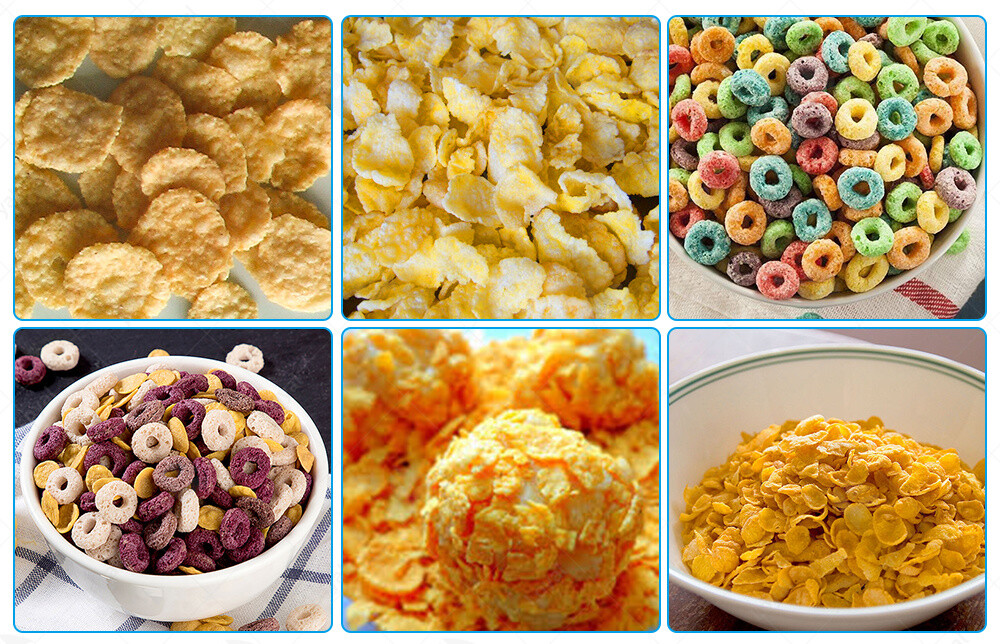
Future Trends and Innovations in Corn Flake Making Machines
As technology continues to advance in the realm of food machinery, the future of corn flake making machines looks promising with ongoing innovations aimed at further enhancing efficiency and achieving greater energy savings. This section explores the anticipated trends and cutting-edge advancements that are shaping the evolution of corn flake production.
Integration of Internet of Things (IoT) Technologies
One of the most significant trends in future corn flake making machines is the integration of Internet of Things (IoT) technologies. IoT-enabled sensors embedded throughout the production line collect real-time data on various parameters such as temperature, humidity, and equipment performance. This data is then analyzed using advanced analytics platforms to optimize production processes. Machine learning algorithms further enhance predictive maintenance capabilities, allowing for proactive equipment servicing to prevent downtime and ensure continuous operation. By harnessing the power of IoT, manufacturers can achieve higher levels of operational efficiency, reduce waste, and maintain consistent product quality.
Advancements in Material Science and Engineering
The development of advanced materials and engineering techniques is set to revolutionize the design and functionality of corn flake making machines. Innovations in food-grade materials, such as high-performance alloys and ceramics, enhance durability, reliability, and hygiene standards of machine components. Furthermore, advancements in 3D printing technology enable the fabrication of complex parts with intricate geometries, optimizing performance and reducing production costs. These material innovations not only extend the lifespan of machinery but also support sustainable manufacturing practices by minimizing resource consumption and waste generation.
Automation and Robotics for Enhanced Precision
Automation and robotics are poised to play an increasingly crucial role in future corn flake making machines, further enhancing precision and efficiency. Automated systems will continue to streamline processes such as ingredient handling, mixing, extrusion, and packaging, reducing reliance on manual labor and minimizing human error. Robotics will enable delicate and precise handling of fragile ingredients and finished products, ensuring consistency in size, shape, and texture of corn flakes. This automation not only accelerates production cycles but also improves safety conditions in manufacturing facilities, creating a more efficient and ergonomic work environment.
Focus on Sustainability and Energy Efficiency
Future trends in corn flake making machines will place a heightened emphasis on sustainability and energy efficiency. Manufacturers are investing in renewable energy sources and implementing energy-saving technologies, such as heat recovery systems and efficient insulation materials. The adoption of closed-loop water systems and recycling programs further reduces environmental impact by conserving resources and minimizing wastewater discharge. These sustainability initiatives not only align with global regulatory standards but also resonate with environmentally conscious consumers who prioritize products manufactured with minimal ecological footprint.
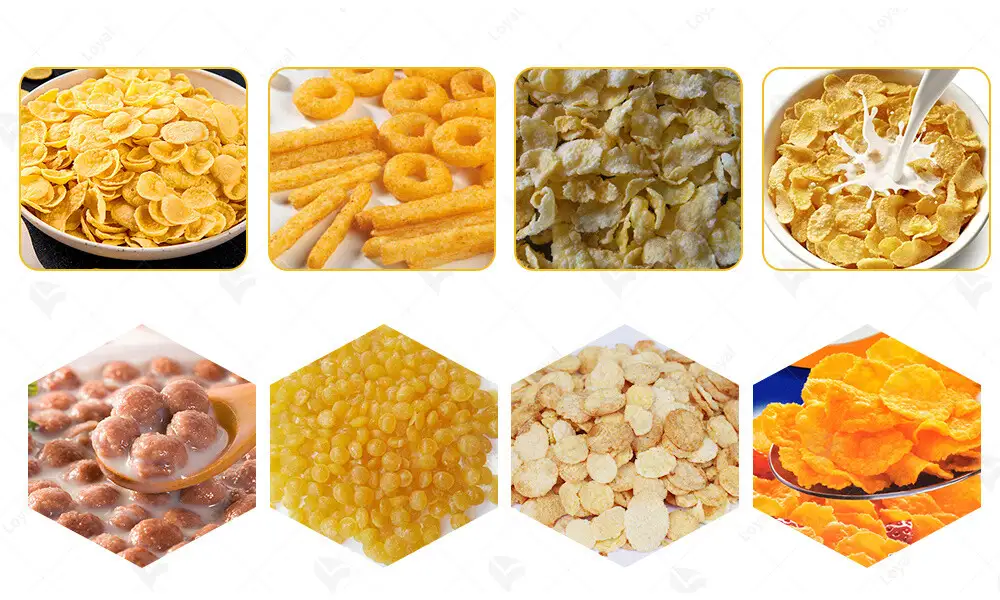
Reference
The following are five authoritative foreign literature websites in the field of Industrial food machinery:
1. Food Engineering Magazine
Website: https://www.foodengineeringmag.com/
2.Food Processing Magazine
Website: https://www.foodprocessing.com/
3.Journal of Food Engineering
Website:https://www.journals.elsevier.com/journal-of-food-engineering
4. Food Manufacturing Magazine
Website:https://www.foodmanufacturing.com/
5. International Journal of Food Science & Technology
Website:https://onlinelibrary.wiley.com/












